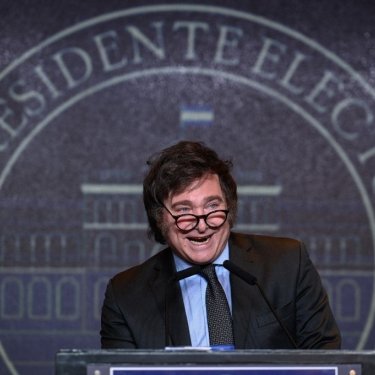RSF sounds alarm about incoming Argentine President’s hostility to news media

Reporters Without Borders (RSF) sounds the alarm about incoming Argentine President Javier Milei’s openly hostile stance towards journalists, and his disdain for international standards on the right to information. Safeguards for journalism must be adopted, says RSF, which will monitor his presidency closely
A far-right ultraliberal economist who is due to be sworn in as Argentina’s president on 10 December, Milei became famous as an economic commentator on radio and TV. For the past five years he has also been notorious for his clashes with journalists and displays of hostility towards them – an aggressiveness he also displays online and on social media. His violent verbal attacks against any critical journalist pose a threat to respect for media freedom in Argentina
Javier Milei's aggressive style towards the media is unfortunately not new on the international political stage. He has come to power by replicating the strategy used by other presidents in the western hemisphere such as Jair Bolsonaro in Brazil and Donald Trump in the United States, who both welcomed Milei’s victory. Like them, the new Argentine president uses a discourse that is openly hostile to journalism and is taken up and amplified by his supporters on social media. This strategy aims to discredit media and journalists that are critical of his policies. As he is indicating a readiness to designate a sector of the media as enemies of his government, Milei’s installation as president is an alarm signal for journalism Argentina
A common thread of Milei’s interventions for more than five years has been a manifest contempt for journalism, embodied in verbal attacks, intimidation, threats of legal action and a political programme that includes dismantling the public media:
● Repeatedly insulting journalists in public
Since 2018, when he was economic commentator on TV and radio, he has repeatedly described journalists as “ignorant,” “imbeciles,” “donkeys” and even “freeloaders.” In most cases, these insults have been uttered as soon as a journalist asks a question he does not like. During the presidential campaign, he referred to Chequeado, one of Argentina’s most reputable fact-checking websites, as “liars.” He has also often referred to journalists and media as “ensobrados” (“bribed”) and he uses such rhetoric to discredit the media in general.
● Threats and physical attacks
Before becoming a deputy in 2021, he threatened journalists with physical violence at least twice on television. On arriving in the northeastern city of Rosario for a political rally during the presidential election campaign in November, he pushed a reporter aside, saying, “This is open to people, not you.” His speeches, which are peppered with attacks on the press, are taken up by his supporters, who repeat the insults towards journalists without restraint. While he was voting on election day, supporters of Milei attacked a Canal 7 public TV crew covering the election and threatened to seize reporter Gabriela Radice’s microphone.
● Lawsuits against journalists
In 2022, while still a deputy, he filed a defamation suit against five journalists, seeking 1 million pesos (about 3,000 dollars) in damages from each of them, after they suggested that he had used Nazi concepts in public statements about the “moral and aesthetic superiority” of his pollical group.
● Desire to dismantle public media
Since his election victory on 19 November, Milei has lost no time in including public radio and television and the national news agency Telam on the list of state enterprises he intends to privatise or close on the grounds, he says, that they have become “a propaganda mechanism.” He has also announced that he will abolish all state advertising in the media.
During Argentina’s election campaign, RSF presented the candidates with ten proposals for reinforcing safeguards for journalistic freedom, independence and diversity in Argentina, which is ranked 40th in RSF's 2023 World Press Freedom Index, 11 places lower than in 2022.
